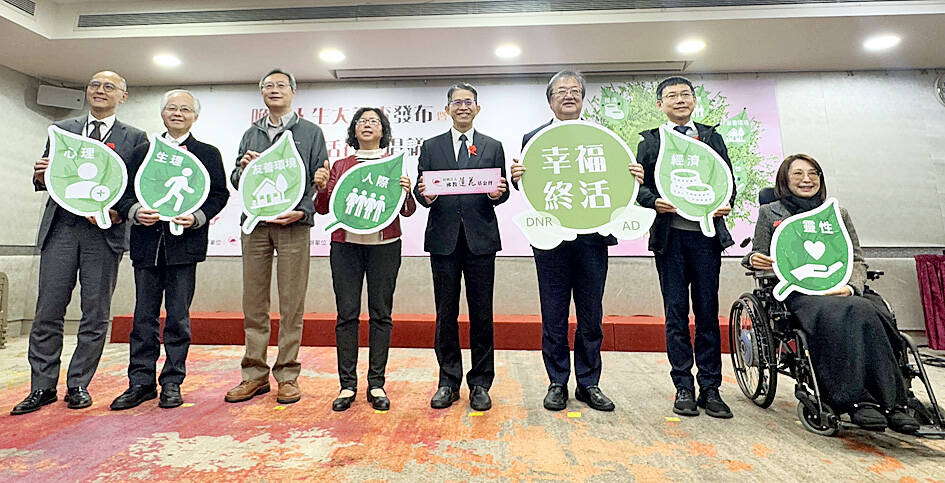The government on Friday pledged to increase subsidies for “good death” procedures, while a hospice care foundation unveiled a poll in which 90 percent of respondents aged 50 and above agreed with the concept of natural death.
The Buddhist Lotus Hospice Care Foundation’s poll was held from June to August last year.
Huang Tsung-cheng (黃宗正), chairman of the foundation and National Taiwan University Hospital’s Department of Psychiatry, said that while the nation’s average lifespan is 80 years, healthy life expectancy is 73.

Photo: Chiu Chih-jou, Taipei Times
This discrepancy means that an average elderly person spends the last few years of their life suffering, he said.
As one in five people in Taiwan are aged 65 or above, the issue of good death is becoming increasingly important, he added.
Citing the foundation’s poll, he said that while 90 percent of respondents agreed with the concept of natural death, only 15 percent had completed a “do not resuscitate” (DNR) instruction.
The percentage of respondents having an “advanced decision to refuse treatment” (ADRT) statement was even lower, he added.
The poll results highlight a lack of general knowledge about such documents, resulting in a lack of willingness to sign them, he said.
The willingness of the family and the costs involved often play a large part in the decision process, he said.
Minister of Health and Welfare Chiu Tai-yuan (邱泰源) on Friday said that without an ADRT statement or DNR instruction, hospitals are obligated to perform certain procedures, such as intubation, cardiac compression and cardiopulmonary resuscitation, to resuscitate a person before they are sent to an intensive care unit.
Such procedures often prolong the person’s life for several days but can cost up to NT$500,000, Chiu said.
Such procedures only delay the inevitable and cause unnecessary suffering to the person, he said.
Such procedures occupy emergency medical resources that could be used in other situations, he said.
Signing an ADRT statement requires an Advance Care Planning (ACP) session that is not covered by subsidies or the National Health Insurance (NHI), and hospitals usually charge NT$3,000 to NT$3,500 for consultation, Chiu said.
These costs are a significant factor preventing people from signing an ADRT statement, he said.
The Ministry of Health and Welfare allows consultation fees for four main categories of people, including those who are terminally ill, to be covered by the NHI, Chiu said, adding that such incentives have led to an increased percentage of people signing ADRT statements and DNR instructions.
The ministry has asked the National Health Insurance Administration to promote and increase subsidies for ACP sessions to waive emergency medical treatment for people so that they have a dignified passing, he added.

An essay competition jointly organized by a local writing society and a publisher affiliated with the Chinese Communist Party (CCP) might have contravened the Act Governing Relations Between the People of the Taiwan Area and the Mainland Area (臺灣地區與大陸地區人民關係條例), the Mainland Affairs Council (MAC) said on Thursday. “In this case, the partner organization is clearly an agency under the CCP’s Fujian Provincial Committee,” MAC Deputy Minister and spokesperson Liang Wen-chieh (梁文傑) said at a news briefing in Taipei. “It also involves bringing Taiwanese students to China with all-expenses-paid arrangements to attend award ceremonies and camps,” Liang said. Those two “characteristics” are typically sufficient

A magnitude 5.9 earthquake that struck about 33km off the coast of Hualien City was the "main shock" in a series of quakes in the area, with aftershocks expected over the next three days, the Central Weather Administration (CWA) said yesterday. Prior to the magnitude 5.9 quake shaking most of Taiwan at 6:53pm yesterday, six other earthquakes stronger than a magnitude of 4, starting with a magnitude 5.5 quake at 6:09pm, occurred in the area. CWA Seismological Center Director Wu Chien-fu (吳健富) confirmed that the quakes were all part of the same series and that the magnitude 5.5 temblor was

The brilliant blue waters, thick foliage and bucolic atmosphere on this seemingly idyllic archipelago deep in the Pacific Ocean belie the key role it now plays in a titanic geopolitical struggle. Palau is again on the front line as China, and the US and its allies prepare their forces in an intensifying contest for control over the Asia-Pacific region. The democratic nation of just 17,000 people hosts US-controlled airstrips and soon-to-be-completed radar installations that the US military describes as “critical” to monitoring vast swathes of water and airspace. It is also a key piece of the second island chain, a string of

The Central Weather Administration has issued a heat alert for southeastern Taiwan, warning of temperatures as high as 36°C today, while alerting some coastal areas of strong winds later in the day. Kaohsiung’s Neimen District (內門) and Pingtung County’s Neipu Township (內埔) are under an orange heat alert, which warns of temperatures as high as 36°C for three consecutive days, the CWA said, citing southwest winds. The heat would also extend to Tainan’s Nansi (楠西) and Yujing (玉井) districts, as well as Pingtung’s Gaoshu (高樹), Yanpu (鹽埔) and Majia (瑪家) townships, it said, forecasting highs of up to 36°C in those areas